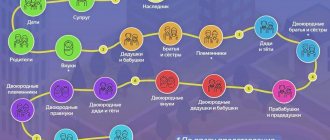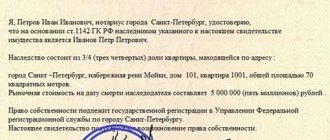10/20/2020 The procedure for inheritance by law is applied when there is no will and establishes a list of persons entitled to the property of the testator and the order of acceptance of the inheritance (the procedure for calling heirs)
For the legal procedure to apply, the following conditions must be met:
- there is no testamentary disposition;
- a will has been drawn up, but not all property is indicated in it;
- the heirs under the will do not accept the inheritance (they are deprived of it, declared unworthy), or they all died before the testator;
- if the will is declared invalid by the court.
In total, the legislation establishes eight lines of persons entitled to inheritance. After the death of a relative, the first line of legal successors is first called upon to inherit property. If they are absent, the second one and so on. The next in line may also receive the right of inheritance if the heirs of the previous one are deprived of their rights, or are removed from them by court, or voluntarily abandoned the inherited property.
Heirs of the first stage
After the death of a relative, in the absence of a will, according to the law, the heirs of the first priority will receive the inheritance: spouse, children, parents. Both children born (adopted) by a deceased person during his lifetime and those born after his death are taken into account, since the determining factor is conception by a specific person.
If children do not have to prove anything in relation to the deceased mother, then complications often arise in the event of the death of the father. The fact of the birth of a child from the testator in a legal marriage or without its registration does not play a role. If the father is not recorded on the birth certificate, genetic testing is often used to prove paternity and other possible evidence - this issue is resolved in court.
Heirs of the same line receive property equally, with the exception of successors by right of representation, replacing parents. If one of the heirs has refused his share (or is unworthy), then the part of the inheritance due to him passes into the general hereditary property and is proportionally divided between the heirs of the called line.
It must be remembered that if the testator was legally married, the surviving spouse has the right to allocate his marital share (50%) from the jointly acquired property. Thus, only half of the common property will be included in the inheritance. In addition, the surviving spouse retains the right to inherit from the deceased marital partner under the law.
Example
. The testator's wife and son act as heirs. The mother allocated ½ share of the property in her favor, after which the remaining half was divided between her and her son. Her total share was ¾ of the inheritance.
Divorced spouses are deprived of the right to inherit if they dissolved the marriage during the life of the testator, or if it was declared invalid.
What happens to the property after the death of a person in the absence of heirs?
If the deceased has no heirs, all his property becomes escheated - Article 1151 of the Civil Code of the Russian Federation.
However, sometimes cases arise when only part of the testator's property becomes escheated. For example, if part of the property was bequeathed and accepted by the legal successors under the will, but for the other part no testamentary dispositions were made and there are no legal heirs.
Part of the inherited property will also be considered escheated in the following cases:
- It was bequeathed to the successor, and he subsequently abandoned it.
- The heir is declared unworthy by the court, but there are no other legal successors.
This kind of inheritance passes to the Russian Federation. The exception is escheatable residential premises.
According to paragraph 2 of Art. 1151 of the Civil Code of the Russian Federation, such property passes by inheritance by law into the ownership of the municipality in which this property is located. If it is located in a subject of the Russian Federation - a federal city of Moscow or St. Petersburg - it becomes the property of such a subject of the Federation. This property is included in the corresponding housing stock for social use.
Second line of inheritance
In the absence of first-degree heirs, the right to property passes to brothers and sisters (siblings, uterine and half-blooded ones), as well as to maternal and paternal grandparents. Their children (nephews of the deceased) are called upon to accept the inheritance by right of representation.
Half-brothers and sisters (children from the first marriages of persons who entered into a second marriage) are not considered blood relatives and are not included in the second line of legal successors. The inheritance between the heirs of the second stage is also divided in equal shares.
Heirs of the third to sixth stage
- Heirs of the 3rd stage are the uncles and aunts of the testator. Their children, that is, cousins of the deceased, can receive an inheritance by right of representation.
- The fourth stage is the great-grandparents of the testator.
- The fifth stage is the children of the testator’s own nephews and nieces (great-grandsons and granddaughters) and the siblings of his grandparents (great-grandparents).
Second cousins, fourth cousins, and so on, relatives are not included in the queue of inheritance without a will - they are not mentioned in the law.
By hereditary transmission
The parents of the deceased are the heirs of the first stage. But if the parent dies within 6 months after the death of the child, without having time to submit an application to the notary for acceptance of the inheritance, then the share of the deceased child passes to the heirs of the parent through hereditary transmission.
That is, if the brother died, and the mother or father did not apply to the notary and also died, then the share intended for the deceased parent will go to the brother or sister.
Example. Oksana was supposed to inherit after the death of her son, Gennady. But the woman took the loss of her son hard, fell ill and died. Gennady's inheritance was to be divided between Oksana and his daughter. Since the mother died before accepting her son’s property, her share passed to her daughter Olga. Thus, Gennady’s inheritance was divided between his daughter and sister, ½ share each.
Seventh line of succession
The heirs according to the law of the 7th stage include:
- stepsons and stepdaughters of the testator - children of his spouse not adopted by the testator;
- the stepfather and stepmother of the deceased are the non-adopting spouse of his parent.
In 2012, the Supreme Court of the Russian Federation, in Resolution No. 9 of May 29, 2012, clarified that the calling of the persons listed above to inheritance depends on two circumstances. Firstly, on the status of marriage with the parent of the stepson and stepdaughter. If it is not terminated, stepsons and stepdaughters are called upon to inherit after the death of their stepfather and stepmother, and stepfather and stepmother - after the death of their stepchildren.
Secondly, the basis for the termination of the marriage matters. If it was terminated during the life of the testator due to the death of the spouse or the declaration of his death, the listed persons receive the inheritance in the 7th line of heirs. At the same time, if the marriage is terminated by dissolution and also declared invalid, they do not have the right to inherit.
What is the procedure for calling heirs to inheritance?
This procedure is regulated by Chapter 63 of the Civil Code of the Russian Federation and is characterized by the fact that the law establishes:
- Circle of heirs (is exhaustive).
- The order of their calling to inheritance.
- Rules for the transfer of inherited property.
The basis for determining the procedure for calling successors to inheritance is the presence of marriage or family relations, as well as other circumstances specified in the law:
- Marriage with the testator.
- Relationship with the testator to a certain degree.
- Adoption of a child by a deceased person or his relative.
- Adoption of a testator.
- The property provided by law between the heir and the testator (the property is not a biological, but a social connection between certain persons - these include stepsons, stepdaughters, stepfather and stepmother).
- Being a dependent of the testator, according to the conditions established by law.
The existence of such relationships must be documented by the applicants for the inheritance. If the documents are lost or missing, the legal successors have the right to confirm the fact of relationship in court or to request the missing documents from the registry office.
The law establishes eight lines of inheritance, which include spouses and relatives up to the sixth degree of kinship. Also, the stepsons, stepdaughters, stepfather, stepmother of the testator, as well as other persons who are not included in the circle of heirs by law, but who were dependent on the testator, have the right to inherit.
The diagram below will help you clearly understand the order of succession according to the law.
Queue Scheme
Important! Adopted children and their offspring, as well as adoptive parents and their relatives, are equal to blood relatives and have equal rights with them - clause 1 of Art. 137 RF IC.
Rights of the testator's dependents
Legal heirs are considered disabled persons included in one of the 7 lines of inheritance, who were fully dependent (supported) of the deceased for at least a year before his death. If there are heirs of previous orders, such dependents are called up along with them. For example, such persons include the testator’s sister (2nd stage), a disabled person of group 1, whom he supported at his own expense. She will receive property on an equal basis with the heirs of the first stage, while the inheritance is divided between them in equal shares.
Dependents who are not included in the list of heirs (distant relatives, strangers) have similar rights, but a condition must be met for them: they must live with the deceased citizen at the time of his death. If there are no heirs of stages 1–7, then these persons form an independent 8th stage of inheritance.
Lawyer's answers to private questions
My brother has a daughter. He divorced his wife 10 years ago. All this time he lived with my family. I am his only sister, my parents died. He was sick, we looked after him. Now he is dead. And his daughter filed documents for inheritance. Can I claim his property?
As a sister, you cannot claim the inheritance since you have a daughter. The only option is to recognize the daughter as an unworthy heir. This is possible if alimony was collected from her for the maintenance of her father, but she did not pay.
My brother died. Can I claim his property without a will if he only has an official wife. They had no children.
No. In this situation, the wife inherits all the property as the heir of the first turn.
My brother died a month ago. Every month he transferred money to me for medicine (I have a group 2 disability, my pension is not enough for medicine). The father will enter into the inheritance as the only heir of the first stage. But my father abandoned us many years ago. Can I receive an inheritance instead?
You need to go to court and recognize yourself as a dependent of the deceased. In this case, all property will be divided between you and your father in ½ share.
My brother made a will for me. His wife wants to contest the will. Will I be able to claim an inheritance if the will is declared invalid?
No. In this case, the inheritance will go to the wife of the deceased.
My husband died 2 months ago. He has a brother on his father's side. Can he claim the inheritance?
The brother is the heir of the second stage. If there are children, a wife and parents, then they are the first to claim the inheritance.
My brother had a car loan. After his death, the bank constantly calls me and demands money. But the brother's children received the inheritance. Can the bank claim the debt from me?
After the death of the debtor, the debt is paid off by his heirs. In this situation, the children of the deceased.
Inheritance by right of representation
The descendants of deceased heirs are called upon to accept property, provided that their parents themselves would have been called upon to inherit if they had remained alive (Review approved by the Presidium of the Supreme Court on June 10, 2020). An heir by right of representation can receive only that part of the inherited property that his parent would have received. The size of the representatives' share depends on their number.
Example
. The heirs of the deceased citizen are two daughters. Each of them is entitled to ½ of the inherited property. One of the daughters predeceased the testator and has three children. Her children (grandchildren of a deceased citizen) receive their mother's share, which is divided in half between them. They are entitled to 1/6 of the first priority inheritance each.
Inheritance by right of representation must be distinguished from hereditary transmission, which assumes that if the heir died after the opening of the inheritance, without having time to accept it within the prescribed period, then the inheritance rights do not go to his descendants by right of representation, but to his heirs by law or by will.
What are the deadlines for accepting an inheritance?
The law defines a special period during which a person claiming an inheritance must declare his rights. This period is 6 months, its duration begins from the date of opening of the inheritance. However, there are exceptions to this rule. Let's look at these cases next:
- If previously called heirs refuse to inherit under a will, the property can be accepted within 6 months from the date of such refusal.
- If the heir is found unworthy by the court, the period will be 6 months from the date the court decision on this issue enters into legal force.
- In the event of the death of a person who has not entered into the inheritance and in the absence of other applicants, the period for submitting documents will be 6 months from the date of death of the testator. If the time period after this was less than 3 months, this period is increased to 3 months.
- If the property is not accepted by the legal successors, a shortened period is provided - 3 months from the date of expiration of the 6 month period for its acceptance.
- If there is a child conceived during the lifetime of the deceased, but unborn at the time of opening of the inheritance, the general period is suspended. After his birth, the period for acceptance of the inheritance by his legal representative will be 6 months.
Important! The inherited property may be accepted by the successor at the end of the period for accepting the inheritance without going to court. To do this, it is necessary to obtain the written consent of all other heirs who accepted the inheritance.
Related articles:
What is the deadline for entering into inheritance this year according to the law of the Russian Federation - detailed answer
How to restore the inheritance deadline this year - step-by-step instructions
Do dependents recognized as disabled participate in the division?
According to the law, dependents of the deceased who are not his blood relatives also have the right to inherit.
Such persons include family members who have not reached the age of 18 , or who are studying in educational institutions on a full-time basis and who lived with the testator for at least 1 year before his death.
They also recognize older people who have reached retirement age and have been living at the expense of the deceased for the last year. They are the heirs of the second and subsequent stages.
Material costs
You won't be able to avoid spending. A complete list of expenses associated with receiving an inheritance by nephews:
- State duty. It is calculated based on the value of the accepted values, the degree of relationship, and the conditions for the transfer of owner rights.
- Registration of a power of attorney. When transferring powers to a lawyer, the services of a notary who certifies the power of attorney are paid.
- Re-registration of inheritance. The nephew independently pays all expenses associated with registration and registration with Rosreestr.
- Debts of the testator. Receiving an inheritance automatically implies accepting the duties and responsibilities that come with the property.
Debt obligations must be repaid. If the amount is large, more than the price of the inheritance, the nephew has the right to refuse the property, for which another application is written. The procedure is described in the relevant publications.
Mandatory share in inheritance
The testator's minor or disabled children, as well as his disabled spouse and parents, inherit, regardless of the contents of the will, at least half of the share that would be due to each of them upon inheritance by law (mandatory share).
The obligatory share includes everything that the heir entitled to such a share receives from the inheritance for any reason, including the value of property consisting of ordinary household furnishings and household items, and the value of the testamentary disclaimer established in favor of such heir.
The obligatory share is allocated from the untested part of the property, and if it is not enough, then also from the bequeathed property.
If the exercise of the right to an obligatory share in the inheritance entails the impossibility of transferring to the heir under the will property that the heir entitled to the obligatory share did not use during the life of the testator, but the heir under the will used for living (a residential building, apartment, other residential premises, dacha, etc.) or used as the main source of livelihood (tools, creative workshop, etc.), the court may, taking into account the property status of the heirs entitled to the obligatory share, reduce the size of the obligatory share.
Any restrictions and encumbrances established in the will for an heir entitled to an obligatory share in the inheritance are valid only in relation to that part of the inheritance passing to him that exceeds the obligatory share.
Who can receive the property?
Anyone who is related to the deceased is a potential contender. In fact, the claims are relevant for the first persons. In case of their absence, the rights are transferred further according to the order established by the Civil Code. Any relatives of the testator, including cousins, are participants in the division. If there is no one left, the property becomes the property of the state. A will allows you to formalize the transfer of any category of subjects:
- individuals (relatives, acquaintances, strangers);
- legal entities (enterprises, organizations, funds);
- to the state budget.
The expression of will is final. It can be challenged during legal proceedings if there are compelling reasons and evidence of the legitimacy of the claims.








